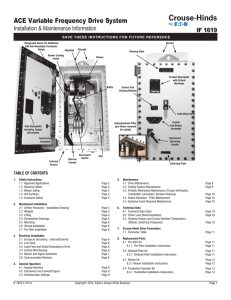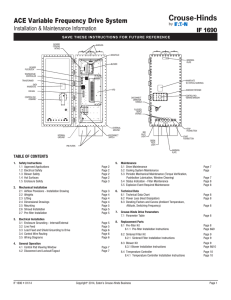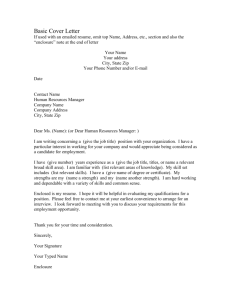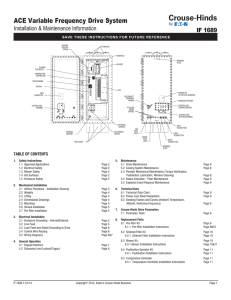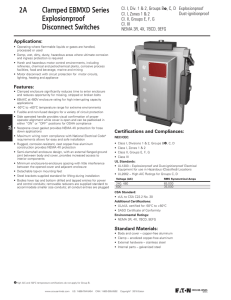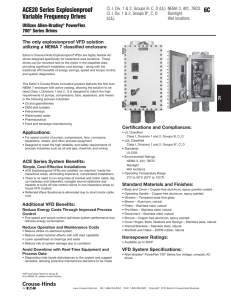ACE20 and ACE30 Variable Frequency Drive System IF 1660 table of contents
advertisement
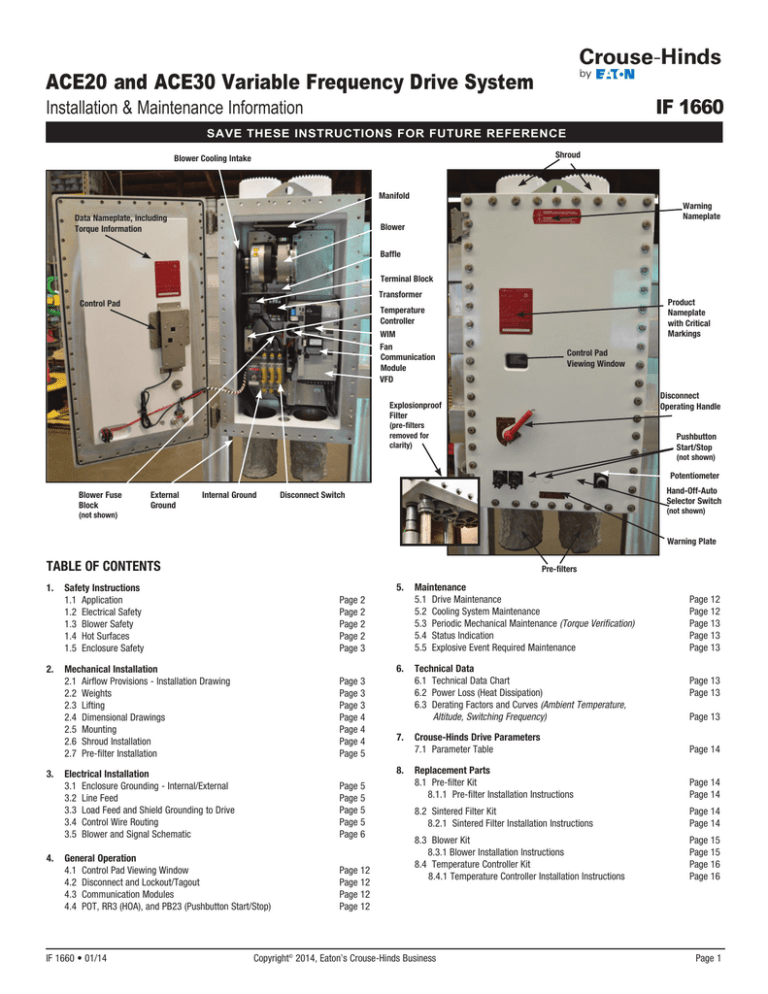
ACE20 and ACE30 Variable Frequency Drive System IF 1660 Installation & Maintenance Information SAVE THESE INSTRUCTIONS FOR FUTURE REFERENCE Shroud Blower Cooling Intake Manifold Data Nameplate, including Torque Information Warning Nameplate Blower Baffle Terminal Block Transformer Control Pad Product Nameplate with Critical Markings Temperature Controller WIM Fan Communication Module VFD Control Pad Viewing Window Disconnect Operating Handle Explosionproof Filter (pre-filters removed for clarity) Pushbutton Start/Stop (not shown) Potentiometer Blower Fuse Block (not shown) External Ground Internal Ground Hand-Off-Auto Selector Switch Disconnect Switch (not shown) Warning Plate table of contents Pre-filters 1.Safety Instructions 1.1 Application 1.2 Electrical Safety 1.3 Blower Safety 1.4 Hot Surfaces 1.5 Enclosure Safety Page 2 Page 2 Page 2 Page 2 Page 3 5.Maintenance 5.1 Drive Maintenance 5.2 Cooling System Maintenance 5.3 Periodic Mechanical Maintenance (Torque Verification) 5.4 Status Indication 5.5 Explosive Event Required Maintenance 2. Mechanical Installation 2.1 Airflow Provisions - Installation Drawing 2.2 Weights 2.3 Lifting 2.4 Dimensional Drawings 2.5 Mounting 2.6 Shroud Installation 2.7 Pre-filter Installation Page 3 Page 3 Page 3 Page 4 Page 4 Page 4 Page 5 6.Technical Data 6.1 Technical Data Chart 6.2 Power Loss (Heat Dissipation) 6.3 Derating Factors and Curves (Ambient Temperature, Altitude, Switching Frequency) 7.Crouse-Hinds Drive Parameters 7.1 Parameter Table 3.Electrical Installation 3.1 Enclosure Grounding - Internal/External 3.2 Line Feed 3.3 Load Feed and Shield Grounding to Drive 3.4 Control Wire Routing 3.5 Blower and Signal Schematic 4. General Operation 4.1 Control Pad Viewing Window 4.2 Disconnect and Lockout/Tagout 4.3 Communication Modules 4.4 POT, RR3 (HOA), and PB23 (Pushbutton Start/Stop) IF 1660 • 01/14 Page 5 Page 5 Page 5 Page 5 Page 6 Page 12 Page 12 Page 12 Page 12 Page 12 Page 12 Page 13 Page 13 Page 13 Page 13 Page 13 Page 13 Page 14 8. Replacement Parts 8.1 Pre-filter Kit 8.1.1 Pre-filter Installation Instructions Page 14 Page 14 8.2 Sintered Filter Kit 8.2.1 Sintered Filter Installation Instructions Page 14 Page 14 8.3 Blower Kit 8.3.1 Blower Installation Instructions 8.4 Temperature Controller Kit 8.4.1 Temperature Controller Installation Instructions Page 15 Page 15 Page 16 Page 16 Copyright© 2014, Eaton’s Crouse-Hinds Business Page 1 1. safety instructions The ACE Explosionproof VFD should be installed, inspected, and maintained by qualified and competent personnel. 1.1 application The ACE Explosionproof VFD is rated Class I, Divisions 1 and 2 for use in hazardous environments, and is designed to match the strict requirements of pumps, compressors, fans, separators, and mixers in such process industries as: • Oil and gas / refineries • OEM skid builders • Petrochemical • Water / wastewater • Pharmaceutical • Food and beverage manufacturing warning To avoid cooling system malfunction, cooling system failure, and personnel injury, remove all loose debris and deposits before energizing. These blowers comply with EN 61800-5-1 safety standards. 1.2 Electrical safety The blower is non-serviceable. Refer to ACE KIT 3, Section 8.3, for replacement instructions. warning: high voltage Electrical power must be OFF before and during inspection or service. Ensure electrical supply to the enclosure is disconnected, locked out and tagged out. Personnel injury or damage to equipment can occur if all power upstream from the enclosure is not fully disconnected prior to opening. Before commissioning the drive and putting it into service, make sure that the motor and all driven equipment are suitable for operation throughout the speed range provided by the drive. The drive can be adjusted to operate the motor at speeds above and below the speed provided by connecting the motor directly to the line power. 1.4 hot surfaces WARNING: burn hazard To avoid personnel injury, use appropriate personnel protective equipment before handling and operating the device. caution To ensure safety and VFD performance, grounding provisions for the enclosure, blower, and VFD must be made before operating. 1.3 blower safety warning Filter Shrouds To avoid cooling system malfunction, cooling system failure, and personnel injury, close and seal the enclosure before energizing. Blower Intake warning: high speed To avoid personnel injury, DO NOT handle the blower or service the enclosure while energized. IF 1660 • 01/14 Copyright© 2014, Eaton’s Crouse-Hinds Business Page 2 2. mechanical installation 1.5 enclosure safety warning To avoid personnel injury and property damage, clean dirt and debris from flat ground joint surfaces before the cover is closed. NEVER energize this equipment if the flat ground joint has been scratched or damaged. All pipe threaded connections into the enclosure require a minimum of five (5) full threads of engagement. All straight threaded connections into the enclosure require a minimum of eight (8) full threads of engagement. Personnel injury or equipment damage can result from threaded joints containing less than the minimum thread engagement required. 2.1 airflow provisions - installation drawing "X" All unused conduit openings must be plugged. UL Listed plug must engage a minimum of five (5) full threads and be a minimum of 1/8” thick. Conduit sealing fittings MUST be installed in each attached conduit run (within eighteen (18) inches of the enclosure) to comply with the latest edition of the National Electrical Code® (NEC) plus any other applicable code. The cover must be properly fastened to the body with all cover bolts torqued to 40-45 ft.-lbs. (19.2-21.5 N-m). Personnel injury or equipment damage can result if the flat joint flame path is not properly fastened. Wireless Interface Module (WIM) offered with ACE20 (Rockwell VFD) must be used with precaution. If the device communicating to the WIM is exposed to the hazardous environment during operation, it must be rated and certified for the area of intended use. For the device used to communicate to the WIM, refer to the manufacturer’s instructions on acceptable use. "X" It is imperative that the enclosure be well ventilated to ensure reliable performance. Adequate space around the intake and exhaust of the enclosure MUST be accommodated. Crouse-Hinds recommends ‘x’ be a minimum of 12 inches (0.3 meters). warning To avoid cooling system malfunction and personnel injury, be sure to torque the first eight (8) cover screws sequentially per Figure 1 before torquing the remaining screws. 2.2 weights 1 7 3 3 7 1 Enclosure Weight 1-5 HP 390 lbs. 7-50 HP 600 lbs. 2.3 lifting 1. Remove top and sides from shipping crate. 5 6 6 5 2. Remove lag bolts from enclosure mounting feet. caution Do not attach shrouds or pre-filters until after enclosure is mounted. 4 2 8 2 8 4 Figure 1 warning To avoid personnel injury and property damage, DO NOT remove or modify the control pad viewing window. caution: unbalanced load To avoid personnel injury, utilize the dedicated lifting eye and handle appropriately to ensure safe installation. 3. Use the dedicated lifting eye to mount enclosure on suitable mounting surface. Select a mounting location that will provide suitable strength and rigidity for supporting the enclosure and all components. IF 1660 • 01/14 Copyright© 2014, Eaton’s Crouse-Hinds Business Page 3 2.4 dimensional drawings 632 24.88 555.6 21.88 398.4 15.69 128 5.04 812.2 31.98 487.7 19.20 438.2 17.25 248.7 9.79 156.6 6.17 5/8" BOLT (4 PLACES) 106.4 4.19 171.5 6.75 106.6 4.20 12.7 .50 101.5 4.00 215.8 8.50 1" NPT 1-1/2" NPT (2 PLACES) ACE Size 1 638.8 25.15 555.6 21.88 125.7 4.95 1176.3 46.31 717.6 28.25 532.1 20.95 281.5 11.08 414.1 16.30 148.7 5.85 398.4 15.69 5/8" BOLT (4 PLACES) 203.2 8.00 88.8 3.50 12.7 .50 93.9 3.70 228.5 9.00 1" NPT ACE Size 2 2" NPT (2 PLACES) 2.5 mounting 1. Select a mounting location that will provide suitable strength, rigidity, and space (per Section 2.1) for supporting the ACE Series system and all contained wiring. caution To avoid cooling system malfunction, cooling system failure, and personnel injury, be sure to mount the enclosure as depicted in Section 2.4. caution To avoid cooling system malfunction, cooling system failure, and personnel injury, be sure to mount the enclosure in a shaded area to avoid direct sunlight. 2. Refer to Section 2.2 for approximate weights and Section 2.4 for dimensions. 2.6 SHROUD installation 1. Remove rubber caps from explosionproof filters. 2. Insert threaded rods into the explosionproof filters. Leave 3-5⁄8 of threaded rod exposed. 3. Place shroud over explosionproof filters and threaded rod, with shroud opening facing back of enclosure. See Figure 2. 4. Insert washer and nuts onto end of threaded rod and tighten securely until shroud is firmly contacting the top wall of the enclosure. See Figure 3. THREADED STUD 3. Install two (2) 5/8” bolts on left side. 4. Tap each of the four (4) mounting feet with a mallet to ensure tight assembly. 5. Align enclosure with the two left side mounting feet engaged with the mounting bolts on selected mounting surface. 6. Tighten two (2) bolts on left side. 7. Install two (2) 5/8” bolts on right side and tighten. 8. After enclosure is positioned and secured in its permanent location, pull wires into the ACE Series system, making sure that they are long enough to make the required connections. IF 1660 • 01/14 Copyright© 2014, Eaton’s Crouse-Hinds Business Figure 2 Page 4 ACORN NUT LOCKING NUT WASHER 3. electrical installation 3.1 enclosure grounding - internal/external Grounding and bonding of the conduit and equipment is required by the National Electrical Code®. A grounding conductor must be connected to the grounding lugs furnished. Determine the type of distribution systems to be used that will comply with NEC requirements and ensure grounding continuity. Figure 3 All conductive equipment that enclose the electrical conductors or attached equipment or forming part of such equipment must be grounded. A permanent connection must be made between all such equipment and the earth. Refer to Section 5.3 for the torque requirements of all terminations within this device. 2.7 pre-filter installation 1. Remove rubber caps from explosionproof filters. 2. Install wire guard using the bracket, screw, and lock washer provided to the bottom filter(s). 3.2 line feed 3. Align guard with notches within the bracket as shown. Notch Disconnect Terminal Shrouds Bracket Guard Detail View 4. Tighten screw. This equipment is designed for line connection directly to the integral disconnect switch. Factory wiring transmits power to the variable frequency drive. 5. Slip pre-filter mesh over guard. 1. Remove disconnect terminal shrouds (only required on 40-50 HP units). 2. Attach line conductors with phase A on the left, B center, and C to the right (see torque table in Section 5.3). 3. Re-install terminal shrouds (only required on 40-50 HP units). 3.3 load feed and shield grounding to drive 6. Be sure to stretch pre-filter elastic band completely around the explosionproof filter and seat the elastic band on the filter’s threads. This will ensure all air flow to the bottom filters passes through the pre-filters. This equipment is designed for load connection directly from the variable frequency drive, although, in the case of an oversized VFD for the given motor, use the VFD and motor manufacturer’s recommendations for proper motor overload protection. In certain cases, it is required to include additional motor overload protection between the VFD and the motor for proper motor overload protection. Always be sure to shield load wiring from line and control wiring to reduce noise. Refer to the drive manufacturer’s manual for further details. 1. Attach load conductors with phase A to W/T1, B to V/T2, and C to W/T3 (see torque table in Section 5.3). Explosionproof Filter 2. Attach motor cable shielding to VFD ground (see recommendations by drive manufacturer). 3. Refer to the drive manufacturer’s manual for further information regarding drive installation. caution Failure to add additional motor overload protection between the VFD and motor when required can cause motor failure and equipment damage. 3.4 control wire routing To avoid the transmission of noise to/from the blower, control system, and/or the variable frequency drive load conductors, be sure to bundle all field control wiring and shield as necessary. IF 1660 • 01/14 Copyright© 2014, Eaton’s Crouse-Hinds Business Page 5 IF 1660 • 01/14 T1 L1 I/O TERMINAL BLOCK (L1) Copyright© 2014, Eaton’s Crouse-Hinds Business FIELD LOAD WIRING T2 VARIABLE FREQUENCY DRIVE L2 (L2) T3 L3 (L3) (5) (4) (3) (2) (1) PE 25 (5) RED BLUE THIS SIDE OF TERMINAL BLOCKS FACING BLOWER (3) (4) ORANGE (1) YELLOW THIS SIDE OF TERMINAL BLOCKS FACING BLOWER HIM HIM BEZEL 12 11 10 9 8 7 DIN RAIL MOUNTED TERMINAL BLOCKS 7-12 RED RED (6) (10) (9) (8) (2) (7) RED DIN RAIL MOUNTED TERMINAL BLOCKS 1-6 6 5 4 3 L3 YELLOW W/ GREEN STRIPE 2 L2 12 1 L1 WIRING FOR SIZE 2 ENCLOSURE ONLY NOT REQUIRED ON SIZE 1 ENCLOSURE BLOWER ACE20 WIRING (16) (15) RED RED (15) 15A FUSE (L3) 15A FUSE + RED (8) BLUE FAN - (9) BLUE TEMPERATURE CONTROLLER (13) (14) AC2 AC1 (L3) (L2) GREEN (L1) (L2) (L1) 15A FUSE RED FAN TERMINAL BLOCK (16) 1COM 1N.O. (L3) (12) (L1) (11) (L2) (14) X2 (13) H1 XF (12) .6A FUSE H3 .6A FUSE TRANSFORMER 1A FUSE X1 SEE NOTE 4 H2 (11) T2 T3 (L2) (L3) H4 (L3) (L2) PILOT LIGHT TERMINAL BLOCK L3 L2 L1 WIRES WITHOUT COLOR ARE BLACK (7) ORANGE (6) (10) GREEN GREEN DISCONNECT SWITCH WHITE YELLOW T1 (L1) (L1) BLACK WHITE WHITE BLACK GREEN PILOT LIGHT RED PILOT LIGHT FIELD GROUND WIRING (EXTERNAL) FIELD GROUND WIRING (INTERNAL) FIELD LINE WIRING 3.5 blower and signal schematic Page 6 IF 1660 • 01/14 Copyright© 2014, Eaton’s Crouse-Hinds Business Page 7 U/T1 I/O TERMINAL BLOCK R/L1 S/L2 V/T2 VARIABLE FREQUENCY DRIVE W/T3 T/L3 (23) (24) (21) (18) (17) (19) PE 1 3 RED POTENTIOMETER GREY BROWN BLUE RED THIS SIDE OF TERMINAL BLOCK FACING BLOWER (17) BLUE 4 TO 20 mA (CUSTOMER PROVIDED SPEED CONTROL INPUT) (19) YELLOW - 4 TO 20 mA (CUSTOMER PROVIDED + SPEED CONTROL INPUT) ACE20 PT RR3 WIRING (18) 9 DIN RAIL MOUNTED TERMINAL BLOCK 2 (20) RED (20) H HAND-OFF-AUTO SWITCH O A (22) (21) GREY (24) (23) (22) WIRES WITHOUT COLOR ARE BLACK 12 11 AUTO RUN CONTACT IF 1660 • 01/14 Copyright© 2014, Eaton’s Crouse-Hinds Business Page 8 U/T1 I/O TERMINAL BLOCK R/L1 V/T2 VARIABLE FREQUENCY DRIVE S/L2 W/T3 T/L3 (27) (26) BLUE THIS SIDE OF TERMINAL BLOCK FACING BLOWER RED (18) (17) (19) PE YELLOW DIN RAIL MOUNTED TERMINAL BLOCK 9 (17) BLUE RED (19) YELLOW (25) PUSHBUTTON START N.O. PUSHBUTTON STOP N.C. POTENTIOMETER 3 2 (18) (25) RED WIRES WITHOUT COLOR ARE BLACK (27) (26) 1 ACE20 PT PB23 WIRING IF 1660 • 01/14 Copyright© 2014, Eaton’s Crouse-Hinds Business Page 9 T1 I/O TERMINAL BLOCK L1 (L1) FIELD LOAD WIRING T2 VARIABLE FREQUENCY DRIVE L2 (L2) T3 L3 (L3) (3) (4) (5) (6) (2) (1) BLOWER THIS SIDE OF TERMINAL BLOCKS FACING BLOWER (3) (1) (2) ORANGE RED BLUE RED RED THIS SIDE OF TERMINAL BLOCKS FACING BLOWER (5) YELLOW HIM 12 11 10 9 8 7 DIN RAIL MOUNTED TERMINAL BLOCKS 7-12 WIRING FOR SIZE 2 ENCLOSURE ONLY NOT REQUIRED ON SIZE 1 ENCLOSURE RED 25 (7) (8) (9) (4) (6) DIN RAIL MOUNTED TERMINAL BLOCKS 1-6 6 5 4 3 L3 RED 2 L2 12 1 L1 YELLOW W/ GREEN STRIPE ACE30 WIRING (16) (15) RED RED (15) (16) 1COM 1N.O. (L3) (12) (L1) (11) (L2) TEMPERATURE CONTROLLER (14) AC2 (13) AC1 (L3) 15A FUSE (L3) 15A FUSE GREEN (L1) (L2) (L1) 15A FUSE (L2) (14) X2 XF H1 (13) (12) .6A FUSE H3 .6A FUSE X1 TRANSFORMER 1A FUSE SEE NOTE 4 H2 (11) H4 (L3) (L3) (L2) (L2) (L1) (L1) (9) (8) WHITE ORANGE PILOT LIGHT TERMINAL BLOCK L3 L2 L1 WIRES WITHOUT COLOR ARE BLACK (7) GREEN GREEN DISCONNECT SWITCH YELLOW T3 T2 T1 BLACK WHITE WHITE BLACK GREEN PILOT LIGHT RED PILOT LIGHT FIELD GROUND WIRING (EXTERNAL) FIELD GROUND WIRING (INTERNAL) FIELD LINE WIRING IF 1660 • 01/14 Copyright© 2014, Eaton’s Crouse-Hinds Business Page 10 U/T1 I/O TERMINAL BLOCK R/L1 V/T2 VARIABLE FREQUENCY DRIVE S/L2 W/T3 T/L3 PE (17) (19) (18) (23) (20) THIS SIDE OF TERMINAL BLOCKS FACING BLOWER BLUE RED 10 H O + 4 TO 20 mA PROVIDED - (CUSTOMER SPEED CONTROL INPUT) (24) HAND-OFF-AUTO SWITCH DIN RAIL MOUNTED TERMINAL BLOCK (20) A BLUE (23) (22) (21) BLUE YELLOW RED BROWN (17) 1 3 POTENTIOMETER (19) (24) (21) (22) 2 12 11 WIRES WITHOUT COLOR ARE BLACK BROWN GREY (18) ACE30 PT RR3 WIRING AUTO RUN CONTACT IF 1660 • 01/14 Copyright© 2014, Eaton’s Crouse-Hinds Business Page 11 U/T1 I/O TERMINAL BLOCK R/L1 V/T2 VARIABLE FREQUENCY DRIVE S/L2 W/T3 T/L3 PE (17) (19) (18) (27) (26) (25) RED BLUE YELLOW RED YELLOW BLUE (17) 3 POTENTIOMETER (19) PUSHBUTTON START N.O. PUSHBUTTON STOP N.C. WIRES WITHOUT COLOR ARE BLACK 1 (25) (26) 2 (18) (27) ACE30 PT PB23 WIRING 4. general operation 4.3 COMMUNICATION MODULES Available Options: ProtocolCat. # Suffix Profibus CP Devicenet CD CAN Open CC • ACE20 Only Modbus CM Ethernet CE Wireless WL • ACE20 Only 4.1 CONTROL PAD VIEWING WINDOW Refer to the drive manufacturer’s manual for information regarding communication module and WIM installation and use. 4.4 pot, rr3 (hoa) and pb23 (PUSHBUTTON START/ STOP) The control pad viewing window shows the control pad display containing such information as drive status and operating data. Refer to the drive manufacturer’s manual for information regarding the control pad display. 4.2 disconnect and lockout/tagout Potentiometer, RR3, and PB23 options, when ordered, get wired to the drive for additional user control. Parameters for these options are set up at the factory. Refer to drive manufacturer’s manual for further information as well as parameters in Section 7.1. 5. MAINTENANCE The disconnect handle is furnished with three (3) holes for lockout/tagout purposes. 1. Turn handle to the ‘off’ position. caution To avoid cooling system malfunction and cooling system failure, be sure to vacuum debris from the enclosure before energizing. NEVER use forced air for the removal of debris from this enclosure. 2. Depress lockout tab at the end of the handle. 3. Install OSHA approved lock or tag. 5.1 DRIVE MAINTENANCE 4. Release lockout tab. Periodic cleaning of the drive fan and heat sink is recommended. Removal of the drive from the enclosure is recommended to ensure debris does not obstruct the cooling system. Refer to the drive manufacturer’s manual for additional maintenance recommendations and specific instructions. warning To avoid ignition of explosive atmospheres, all circuits must be de-energized before opening cover. 5.2 cooling system maintenance 1. Clean pre-filter periodically (recommended per parameters and values below). Remove pre-filter and rinse with water as needed. Lockout Tab Parameter Parameter Parameter Maintenance Testpoint Code Number Type Description Check Point ACE20 234 Utility Testpoint 1 Sel 2 (Heat Sink Temperature) 235 Utility Testpoint 1 Data 105 236 Utility Testpoint 2 Sel 37 (Control Board Temperature) 237 Utility Testpoint 2 Data 72 ACE30 U4-08 Maintenance Monitors Heat Sink Temperature 105 2. Clean sintered filter as needed. Use of abrasives on the explosionproof filters may compromise the integrity of the cooling system. 3. Clean/inspect blower intake. caution To avoid damage to the integral disconnect operating mechanism, be sure the disconnect coupling is in the off position before closing cover. Blower Intake 4. For ACE20 (Rockwell VFD), clean/inspect muffin fan. 5. Clean/inspect temperature controller. 6. Perform visual, electrical, and mechanical checks on all components on a regular maintenance schedule. NFPA 70B recommends maintenance intervals not exceeding 2 months. 7. Visually check for any damage to the filter assemblies, flat joints, threaded joints, journal joints, and window. Disconnect Shaft Disconnect Coupling ‘OFF’ Position 8. Visually check for evidence of excessive heating within the enclosure. 9. Mechanically check that all parts are properly assembled and operating mechanisms are in proper working condition. 10. Verify airflow provisions are maintained per Section 2.1. IF 1660 • 01/14 Copyright© 2014, Eaton’s Crouse-Hinds Business Page 12 5.3 periodic mechanical maintenance (torque verification) Torque Requirements Item Description ACE20 Drive (0.5-5 HP) Line/Load & Ground ACE20 Drive (7.5-20 HP) Line/Load & Ground ACE20 Drive (25-50 HP) Line/Load & Ground ACE30 Drive (0.75-5 HP) Line/Load ACE30 Drive (7.5-20 HP) Line Load Ground ACE30 Drive (25-30 HP) Line/Load Ground Drive Control (I/O) ACE20 Drive ACE30 Drive Disconnect 30 Amp 60 Amp 100 Amp Blower Fuse Block Terminal Blocks Temperature Controller Transformer Internal Ground Lug External Ground Lug Blower Manifold Hose Clamps Cover Bolts Wire Range Torque Required 18-6 AWG (0.9-13.2 mm ) 12 in.-lbs. (1.4 N-m) 18-6 AWG (0.9-13.2 mm2) 12 in.-lbs. (1.4 N-m) 14-3 AWG (2.1-26.6 mm2) 16 in.-lbs. (1.8 N-m) 14-10 AWG (2.1-5.2 mm2) 12 in.-lbs. (1.4 N-m) 8-6 AWG (8.4-13.2 mm2) 10-6 AWG (5.3-13.2 mm2) 10-8 AWG (5.3-8.3 mm2) 25 in.-lbs. (2.8 N-m) 25 in.-lbs. (2.8 N-m) 45 in.-lbs. (5.1 N-m) 6-4 AWG (13.3-21.1 mm ) 8-6 AWG (8.4-13.2 mm2) 50 in.-lbs. (5.7 N-m) 45 in.-lbs. (5.1 N-m) 22-14 AWG (0.4-2.0 mm2) 24-16 AWG (0.2-1.3 mm2) 5.2 in.-lbs. (0.59 N-m) 4.8 in.-lbs. (0.54 N-m) 18-8 AWG (0.9-8.3 mm2) 14-4 AWG (2.1-21.1 mm2) 14-2/0 AWG (2.1-67.4 mm2) 18-10 AWG (0.9-5.2mm2) 24-8 AWG (0.2-8.3 mm2) 24-12 AWG (0.2-3.3 mm2) 18-16 AWG (0.9-1.3 mm2) 16-2/0 AWG (1.4-67.4 mm2) 6-1/0 AWG (13.3-53.4 mm2) N/A N/A N/A 17 in.-lbs. (1.9 N-m) 30 in.-lbs. (3.4 N-m) 120 in.-lbs. (13.5 N-m) 20 in.-lbs. (2.3 N-m) 8 in.-lbs. (0.9 N-m) 5 in.-lbs. (0.54 N-m) 12 in.-lbs. (1.4 N-m) 120 in.-lbs. (13.5 N-m) 50 in.-lbs. (5.6 N-m) 20 in.-lbs. (2.3 N-m) 20 in.-lbs. (2.3 N-m) 45 ft.-lbs. (61 N-m) 2 2 5.4 status indication 6. technical data 6.1 technical data chart Max. CC-H Base Encl. Discon. Cat. # Size Rating (Amps) *ACE20 1 *ACE20 2 *ACE20 3 *ACE20 5 *ACE20 1 600 *ACE20 2 600 *ACE20 3 600 *ACE20 5 600 *ACE20 7 ACE20 10 ACE20 15 ACE20 20 ACE20 25 ACE20 30 ACE20 40 ACE20 50 *ACE30 1 *ACE30 2 ACE30 3 ACE30 5 *ACE30 2 600 ACE30 3 600 ACE30 5 600 *ACE30 7 ACE30 10 ACE30 15 ACE30 20 ACE30 25 ACE30 30 1 30 30 2 1 Max. Discon. Input Power Temp. Nominal Output Temp. Fuse Rating Loss Derating HP Rating Rating Type (Amps) (Watts) Factor (Amps) J J 60 J 100 J 30 J 30 J 2 60 J 1 2 3 5 1 2 3 5 7.5 10 15 20 25 30 40 50 0.75 2 3 5 2 3 5 7.5 10 15 20 25 30 1.6 2.6 3.9 6.9 1.3 2.1 3.0 5.3 9.5 12.5 19.9 24.8 31.2 36.7 47.7 59.6 2.1 4.3 8.1 9.4 3.6 5.1 8.3 14.0 20.0 24.0 38.0 44.0 52.0 2.1 3.4 5.0 8.0 1.7 2.7 3.9 6.1 11.0 14.0 22.0 27.0 34.0 40.0 52.0 65.0 2.1 4.1 6.9 8.8 2.7 3.9 6.1 11.1 17.5 23.0 31.0 38.0 44.0 63 76 93 164 54 65 83 142 594 618 726 794 841 859 1010 1117 68 81 121 126 45 61 72 562 685 754 855 921 999 T6 N/A T6 N/A T6 N/A T6 N/A T6 N/A T6 N/A T6 N/A T6 N/A T4A N/A T4A N/A T4A N/A T4A N/A T4A N/A T4A N/A T4A N/A T4A Figure 4 T6 N/A T6 N/A T6 N/A T6 N/A T6 N/A T6 N/A T6 N/A T4A N/A T4A N/A T4A N/A T4A N/A T4A N/A T4A N/A VFD Mfg. Part # 20BD027A0AYNANC0 20BE022A0AYNANC0 20BD027A0AYNANC0 20BD065A0AYNANC0 CIMR-AU4A0009FUA CIMR-AU5A0006FUA CIMR-AU4A0031FUA CIMR-AU4A0044FUA *Additional motor overload protection is required between VFD output and motor due to oversized VFD used. For other catalogs and setups refer to section 3.3 of this manual. **Modified product designs may vary in terms of technical information. Contact factory for additional information. There are two lights for the status indicator - a GREEN light to signify RUN and a RED light to signify STOP or fault condition. When both lights are off, this indicates the power is off to the drive. 6.2 power loss (heat dissipation) When the ACE Series enclosure is not installed in a well ventilated area, provisions must be made to account for heat generation and ensure proper operation of the device. 6.3 de-rating factors and curves (ambient temperature, altitude, switching frequency) The final drive output rating is a multiplication of all applicable de-rating factors. Ambient Temperature De-rating 5.5 explosive event required maintenance In the event of an explosion within the enclosure, the filter assemblies and pre-filters must be replaced. Personnel injury or equipment damage may result from failure to replace the filters with new filters after an explosion occurs within the enclosure. Inspect all other components and verify that they are in proper operating condition. Consult Crouse-Hinds for replacement parts as needed. Altitude and Switching Frequency De-rating: Refer to the drive manufacturer’s de-rating guidelines for altitude and switching frequency and ensure compliance. WARNING: burn hazard To avoid personnel injury, allow sufficient time for the enclosure to cool prior to servicing. IF 1660 • 01/14 Copyright© 2014, Eaton’s Crouse-Hinds Business Page 13 7. crouse-hinds drive parameters 7.1 parameter table Parameter Number Parameter Type Parameter Value Parameter Description ACE20 196 Utility Parameter Access Level 1 (Advanced) 151 Dynamic Control PWM Frequency 2 (2 kHz) ACE20 RR3 (HOA) 196 Utility Parameter Access Level 1 (Advanced) 320 Inputs & Outputs Analog Input Configuration Bit 0 = 1 (Current) Tuning Carrier Frequency 1 (2 kHz) ACE30 C6-02 ACE30 RR3 (HOA) A1-03 Initialization Initialize Parameters 2220 H3-02 Terminal Functions Terminal A1 Function Selection 2 H3-06 Terminal Functions Terminal A3 Function Selection F Initialize Parameters 3330 6. Be sure to stretch pre-filter elastic band completely around the explosionproof filter and seat the elastic band on the filter’s threads. This will ensure all air flow to the bottom filters passes through the pre-filters. ACE30 PB23 (Pushbutton Start/Stop) A1-03 Initialization Explosionproof Filter To ensure cooling system performance, these parameters must be maintained at all times while observing the appropriate de-rating factors. 8. replacement parts ACE Series systems are designed to provide years of reliable service. However, should the need for replacement parts arise, they are available through your CrouseHinds Distributor. Assistance may also be obtained through your Crouse-Hinds Sales 8.2 SINTERED FILTER kit Representative or the Crouse-Hinds Customer Service Department. ACE KIT2: Filter Assembly (1 pc.) 8.1 pre-filter kit 8.2.1 sintered filter installation instructions ACE KIT1: Pre-filter and Hardware (1 pc.) 8.1.1 pre-filter installation instructions 1. Remove rubber caps from explosionproof filters. 2. Install wire guard using the bracket, screw, and lock washer provided to the bottom filter(s). Filter Shrouds 3. Align guard with notches within the bracket as shown. 1. Remove shroud and pre-filters and place all parts in a secure area. 2. Using a 1” socket wrench, remove all filters from the enclosure (top and bottom). 3. Remove rubber caps from explosionproof filters. 4. Apply thread grease to threads of explosionproof filters. 5. Install new filters (top and bottom) and torque each to 133 ft.-lbs. (180 N-m). Notch Bracket 6. Install pre-filters and shrouds; refer to Sections 2.6 and 2.7. Guard Detail View 4. Tighten screw. 5. Slip pre-filter mesh over guard. IF 1660 • 01/14 Copyright© 2014, Eaton’s Crouse-Hinds Business Page 14 8.3 blower kit 10. Align new manifold clamp bracket to threaded studs. Be sure the manifold clamp bracket flanges point toward the interior of the enclosure. ACE KIT3: Blower, Manifold, and Hardware (1 pc.) 11. Install four (4) lock washers and nuts on threaded studs hand tight before applying required torque. Tighten to 20 in.-lbs. DO NOT over-tighten. 8.3.1 blower installation instructions 1. Disconnect blower power, ground, and control leads from terminal blocks (refer to wiring diagrams in Section 3.5). 12. Slide new blower/bracket assembly into place until fully seated, aligning to the threaded studs and the manifold. caution To avoid system malfunction and electrical shock, be sure that all wires are aligned in the baffle’s wire pass through. 13. Tighten nuts wrench tight. 14. Tighten manifold hose clamp, while compressing the manifold to the blower, to 20 in.-lbs. 15. Re-attach blower cooling intake and tighten hose clamp to 20 in-lbs. Be sure to align bottom of blower cooling intake to the explosionproof filter at the bottom of the enclosure. 2. Loosen five (5) nuts holding blower bracket and baffle to mounting plate. DO NOT remove. 3. Loosen and remove manifold clamp bracket nuts and lock washers. DO NOT remove jam nuts positioned behind the manifold clamp bracket. Blower Cooling Intake Manifold Clamp Bracket 16. Terminate the blower power wires to the appropriate terminal block connections (refer to wiring diagrams in Section 3.5). Loosen and DO NOT remove nut during replacement 17. Perform a continuity check between each blower power terminal and each phase of the integral disconnect switch. 18. Terminate the blower control wires to the appropriate terminal block connections (refer to wiring diagrams in Section 3.5). 19. Perform a continuity check between each blower control terminal and the temperature controller (refer to wiring diagrams in Section 3.5). 20. Terminate the blower ground wire to the appropriate terminal block connection (refer to wiring diagrams in Section 3.5). 4. Remove blower and brackets. 5. Remove manifold and manifold clamp bracket. 6. Remove blower cooling intake and hose clamp from old blower assembly and hold for re-assembly. 21. Perform a continuity check between the ground terminal and the ground lug adjacent to the integral disconnect switch. 7. Loosen and remove three (3) screws and washers holding the baffle and plug plate to the blower bracket. Remove baffle and plug plate and hold for re-assembly. 8. Attach baffle and plug plate to new blower bracket using the same three (3) screws and washers. 9. Align new manifold to enclosure wall. IF 1660 • 01/14 Copyright© 2014, Eaton’s Crouse-Hinds Business Page 15 8.4 TEMPERATURE CONTROLLER ACE KIT5: Temperature Controller 8.4.1 TEMPERATURE CONTROLLER installation instructions 1. Disconnect wire terminals from temperature controller. Do not remove wires from terminals. 2. Loosen two (2) nuts holding the temperature controller to the mounting plate. Do not remove. 3. Remove temperature controller. 4. Insert new temperature controller into place on mounting plate and tighten two (2) nuts down wrench tight. 5. Reconnect wire terminals to the temperature controller, ensuring terminals are fully inserted. All statements, technical information and recommendations contained herein are based on information and tests we believe to be reliable.The accuracy or completeness thereof are not guaranteed. In accordance with Crouse-Hinds “Terms and Conditions of Sale,” and since conditions of use are outside our control, the purchaser should determine the suitability of the product for his intended use and assumes all risk and liability whatsoever in connection therewith. Eaton’s Crouse-Hinds Business 1201 Wolf Street, Syracuse, New York 13208 • U.S.A. Copyright© 2014 IF 1660 Revision 3 Revised 01/14 Supersedes 12/13
